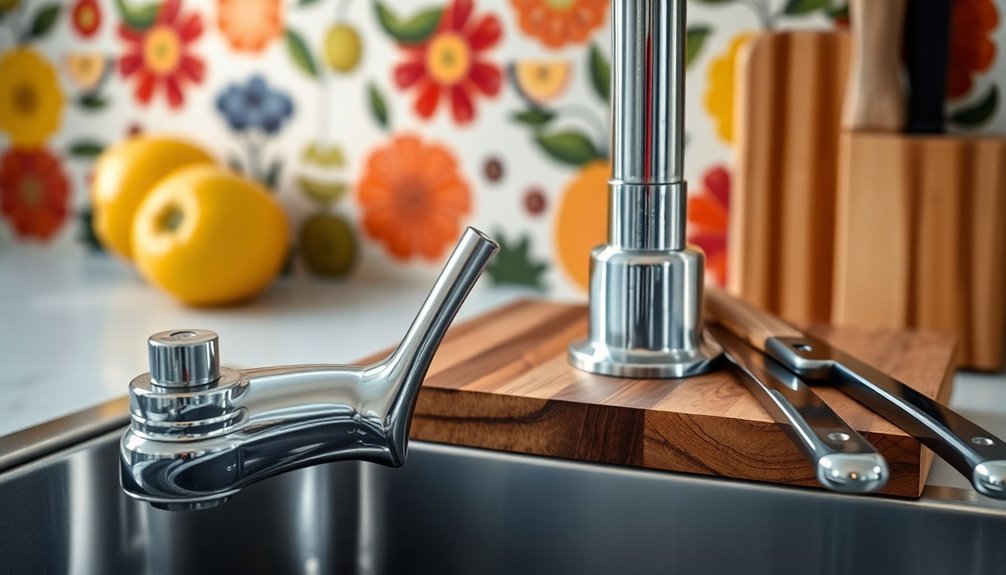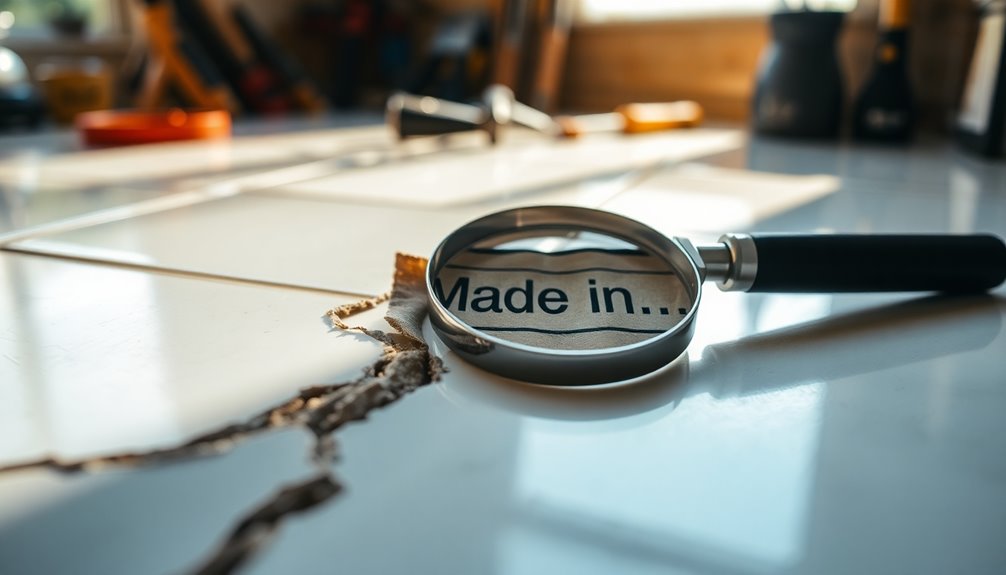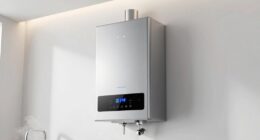As a homeowner, understanding product quality helps you make informed decisions that enhance safety, efficiency, and comfort in your home. Look for safety certifications like UL and Energy Star to guarantee your purchases meet industry standards. High-quality materials may cost more upfront, but they save you money on repairs and energy bills in the long run. Always review warranty options and consider customer feedback to gauge reliability. By investing in durable products, you'll avoid frequent replacements and maintain your home's value. Keep exploring to uncover valuable insights that can guide your choices for a better living environment.
Key Takeaways
- Invest in high-quality appliances and materials to enhance durability and reduce long-term replacement costs.
- Look for safety certifications like UL and Energy Star for reliable performance and efficiency.
- Review warranty terms and customer support options to ensure protection against defects.
- Research brand reputation and customer reviews to identify reliable products and avoid low-quality items.
- Conduct a cost-benefit analysis to balance initial expenses against long-term savings on energy and maintenance.
Importance of Product Quality

When it comes to your home, product quality matters more than you might think. Investing in high-quality appliances and fixtures not only enhances your home improvement efforts but also delivers significant benefits. Products made from superior materials and construction last longer, saving you money on replacements and repairs down the line. Look for reputable certifications like Energy Star or UL, which guarantee safety and efficiency. You'll enjoy peace of mind knowing your choices comply with standards that promote reliability. Furthermore, choosing products designed with water efficiency can help conserve resources and lower utility bills. Additionally, selecting products like air purifiers with HEPA filters can drastically improve your indoor air quality. Regular maintenance of these purifiers, such as cleaning filters, is essential for keeping them functioning optimally. Products with strong warranties reflect manufacturer confidence in their durability. Don't underestimate the power of consumer reviews; they provide real insights into product performance, helping you make informed decisions that protect your home and budget. Moreover, selecting products with low hidden fees can enhance your overall investment by ensuring transparency in costs. Furthermore, consider the importance of budget management when selecting high-quality products to ensure you allocate funds wisely without compromising on quality.
Identifying High-Quality Products

Identifying high-quality products is essential for homeowners who want to guarantee their investments stand the test of time. Start by looking for safety certifications like Underwriters Laboratories (UL) to ascertain you're not facing a fire hazard. Check for environmental ratings such as Energy Star, which can save you money on utility bills. Additionally, ensure that the product adheres to local fire safety codes, as this can greatly affect its safety and performance. Investing in high-quality materials can also lead to long-term savings through reduced maintenance costs and increased durability. Moreover, understanding heat pump mechanics can help you select energy-efficient systems that provide effective heating and cooling. Additionally, consider the effectiveness of features like HEPA filtration which can significantly improve indoor air quality.
Research product reviews and performance ratings from trustworthy sources to evaluate reliability and longevity. Verify that the products comply with industry standards and local building codes. Finally, prioritize items with robust warranties, as they often indicate the manufacturer's confidence in their quality. Additionally, consider purchasing from reputable retailers like Appliances Connection, which offers a wide range of brands and products.
| Criteria | Importance |
|---|---|
| Safety Certifications | Prevents fire hazards |
| Environmental Ratings | Energy efficiency |
| Product Reviews | Evaluates reliability |
| Compliance with Standards | Ensures suitability |
| Robust Warranties | Reflects quality confidence |
Understanding Warranties and Support

Understanding warranties and support is essential for homeowners who want peace of mind with their purchases. Warranties typically cover defects in materials and workmanship, with durations ranging from one year to a lifetime.
It's wise to check the warranty terms carefully, as they may include exclusions or conditions to maintain coverage. Extended warranties can offer additional protection, covering repairs or replacements for a set period.
Don't overlook the importance of customer support; reputable brands provide dedicated assistance for warranty claims and product issues, enhancing your experience.
To guarantee successful claims, keep track of your purchase receipts and warranty documentation, as proof of purchase is often required for validation. This knowledge empowers you to make informed decisions.
Evaluating Cost vs. Value

Evaluating cost versus value is essential for homeowners making purchasing decisions.
When you consider energy-efficient appliances, the initial higher cost often pays off, saving you up to 30% on energy bills over time.
Assess warranty lengths and service options; longer warranties typically indicate better durability and performance, suggesting higher quality.
Comparing similar products is vital; investing in quality materials reduces the frequency of replacements and repairs, ultimately saving you money.
Conduct a cost-benefit analysis that weighs long-term savings against upfront expenses.
Remember, higher-rated products often justify their price through improved performance and lower maintenance costs.
Researching Brands and Reviews

When you're researching brands and reviews, focus on their reputation to gauge reliability and performance.
Check customer feedback on platforms like Amazon and Home Depot to compare product performance and material quality.
This way, you can make informed decisions that align with your needs and expectations.
Brand Reputation Analysis
How can you guarantee you're choosing a reliable brand for your home products? Start by researching brand reputation through industry awards and certifications.
Check customer feedback on platforms like Consumer Reports and Trustpilot, as these sources can provide insights into reliability and quality.
Look for brands with a long history; established companies often offer better customer service and proven tracks of satisfaction.
Analyze reviews across multiple platforms to gauge product performance and durability.
Also, investigate any recalls or safety issues that might affect your confidence in the brand.
Finally, consider warranties and customer support; brands that stand behind their products typically achieve higher customer satisfaction ratings, ensuring you make a wise investment for your home.
Product Performance Comparisons
In the competitive landscape of home products, understanding product performance comparisons is vital for making informed decisions.
Start by researching brands with high ratings—look for products with at least 4 stars on platforms like Amazon and Home Depot. Utilize comparison tools like Google Shopping and PriceGrabber to analyze pricing and performance across different brands and models.
Don't forget to check detailed specifications and warranties on manufacturer websites, as this helps evaluate product reliability. Reading customer reviews offers insight into real-world performance and highlights potential issues often overlooked in descriptions.
Finally, investigate brand reputation by researching their history and customer service records. This thorough approach guarantees you choose quality products that meet your needs.
Material Quality Assessment
Evaluating the quality of materials used in home products is essential for ensuring you make a wise investment. Start by researching product reviews on platforms like Amazon, Home Depot, and Lowe's to gauge homeowner satisfaction regarding material quality and performance.
Check detailed specifications and warranties on manufacturer websites to understand the durability of materials, especially in relation to water damage. Use comparison tools like Google Shopping and PriceGrabber to find the best value for the quality offered.
Look for safety certifications, such as Underwriters Laboratories (UL) or Energy Star ratings, ensuring the products meet established safety standards. Finally, review local building codes to confirm that your chosen products comply, indicating their overall quality and suitability for your home.
Common Product Quality Red Flags

When you’re shopping for products, keep an eye out for signs of poor material durability and inconsistent performance issues. Look for any indications of wear and tear during demonstrations or while inspecting the product in-store, as these can signal future problems. Additionally, read customer reviews to identify common complaints regarding durability and performance, which can help you make a more informed decision. By being vigilant, you can avoid making productbuying mistakes to avoid that could lead to dissatisfaction with your purchases.
If a product feels flimsy or has a history of breaking down quickly, it's a red flag that you shouldn't ignore.
Trust your instincts and do your homework to avoid costly mistakes.
Poor Material Durability
Poor material durability can greatly impact your home's long-term functionality and aesthetics. Products made from low-quality materials, like flimsy plastics or untreated wood, are more susceptible to damage and often have shorter lifespans. This leads to increased replacement costs, which can strain your budget.
Pay attention to craftsmanship; look for uneven seams, loose fittings, or inconsistent finishes, as these can indicate poor material durability. Brands offering limited warranties usually lack confidence in their product, signaling a potential red flag.
To make informed decisions, conduct thorough research and check Consumer Reports for insights into common durability issues. Finally, consider the environmental impact of materials, as those with harmful volatile organic compounds (VOCs) may compromise your home's safety over time.
Inconsistent Performance Issues
Experiencing inconsistent performance issues can be frustrating, especially when it leads to frequent product failures or malfunctions. This can be particularly concerning in areas like home security, where reliability is essential.
Here are some red flags to watch for:
- Excessive maintenance requirements or high defect rates
- Frequent negative consumer reviews about reliability
- Brands that often change product designs or discontinue items
- High warranty claims and return rates
These indicators can signal poor quality, impacting your Improvement Projects.
If you notice any of these issues, it's wise to reconsider your choices to avoid unnecessary repairs and dissatisfaction.
Prioritizing reliable products can save you time, money, and stress in the long run.
Long-Term Benefits of Quality Investments

Investing in quality home products can transform your living space and save you money in the long run. High-quality appliances typically consume less energy, potentially lowering your energy bills by up to 15%.
When you choose durable materials and fixtures for home improvement projects, you extend their lifespan, reducing the need for frequent replacements. This not only saves you money but also enhances safety, especially with fire-rated doors and reliable smoke detectors.
Quality home improvement items often come with better warranties, offering financial protection against defects. Plus, investing in quality maintenance tools helps you catch issues early, preventing costly emergency repairs.
Ultimately, these smart investments lead to significant long-term savings and a safer, more efficient home.
Frequently Asked Questions
How to Know if a Product Is Good or Not?
To know if a product's good, start by reading reviews on trusted sites like Consumer Reports and Amazon.
Look for safety certifications, which show it meets standards. Check the manufacturer's warranty; a longer one often indicates better quality.
Compare features with similar products to guarantee you're getting the best option.
Finally, ask friends or family for recommendations—they can provide valuable insights based on their experiences.
This approach will help you make informed choices.
What Do I Need to Know as a New Homeowner?
As a new homeowner, you need to understand the importance of investing in quality products.
Look for items with safety certifications, like UL or Energy Star, to guarantee they're reliable.
Don't overlook warranties; reputable brands often provide solid options that can save you money later.
Reading customer reviews can guide your decisions, and considering energy-efficient products can help reduce your utility bills.
Prioritizing these factors will enhance your home's value and comfort.
How Can You Say a Product Has Good Quality?
You can think of product quality like a sturdy bridge versus a rickety one. A good quality product often has safety certifications, uses durable materials, and boasts positive consumer reviews.
Plus, it usually comes with a solid warranty, showing the manufacturer's confidence.
Don't forget to take into account the brand's reputation; established companies often prioritize quality control.
What Is an Example of a Product of Good Quality?
A great example of a high-quality product is a Bosch dishwasher.
It's built with durable stainless steel, which resists rust and corrosion, ensuring it lasts for years.
You'll appreciate its Energy Star certification, saving you money on energy bills while being eco-friendly.
Plus, it often comes with a solid warranty, reflecting the manufacturer's confidence.
With excellent ratings from independent organizations, you're making a smart choice by selecting this reliable appliance for your kitchen.
Conclusion
In the world of homeownership, choosing quality products is like planting a sturdy tree; it supports and enriches your life for years to come. By paying attention to product quality, evaluating cost versus value, and doing your research, you can make informed decisions that pay off in the long run. Don't overlook the importance of warranties and support, as they're your safety net. Invest wisely, and you'll enjoy a home filled with reliable, lasting treasures.









